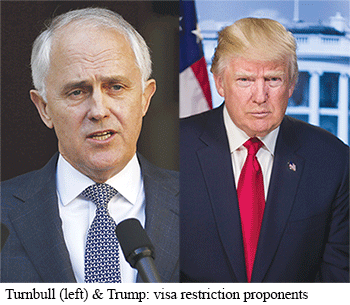 Immigration crackdowns in the US and Australia could signal a “new period” for international higher education in which academic and student mobility is “more contested and problematic”. That is the stark warning for universities after both countries announced visa changes that could prevent their institutions from attracting foreign scholars and students.
Immigration crackdowns in the US and Australia could signal a “new period” for international higher education in which academic and student mobility is “more contested and problematic”. That is the stark warning for universities after both countries announced visa changes that could prevent their institutions from attracting foreign scholars and students.
In mid-April Malcolm Turnbull, the Australian prime minister, announced that the country’s four-year visa programme for temporary foreign workers would be scrapped and replaced by a more restrictive new system issuing visas for two or four years.
For the shorter visa, over 200 occupations — including biochemist, geophysicist, historian and life scientist — will be removed from the existing list of 650 eligible professions. It has been suggested that the list for the longer visa will be even more stringent. The new programme “will be manifestly, rigorously, resolutely conducted in the national interest to put Australians and Australian jobs first”, says Turnbull.
Institutions in Australia’s Group of Eight, which comprises the country’s leading research universities, currently have 2,217 academic and professional staff on the current so-called 457 visas.
Meanwhile, in late April US president Donald Trump signed an executive order to reform a temporary visa programme used to place foreign workers in high-skilled US jobs. It’s unclear exactly how the programme will change, but Trump said that H-1B visas, used by universities to hire postdoctoral researchers and by international students to find graduate employment, “should include only the most skilled and highest-paid applicants and should never, ever be used to replace American workers”. However, the announcement fell short of his campaign pledge to end the H-1B visa programme.
These changes, coupled with continued uncertainty over the mobility of academics and students to and from the UK post-Brexit, mean that three of the world’s leading countries for international scholars and students could become significantly less open.
Simon Marginson, director of the Centre for Global Higher Education at the UCL Institute of Education, London, told Times Higher Education that both sets of changes are “potentially regressive, in that in hiring practices, nationality becomes more important than before, vis-a-vis merit”. “My personal hunch is we are moving into a new period in which, at a general level, mobility is more contested and problematic and national preference plays a larger role in professional appointments,” he says.
Mary Sue Coleman, president of the Association of American Universities, says that the proposed visa changes in the US would “severely undermine” universities’ abilities to bring the “world’s best and brightest… students, educators, and scientists into the country”.
Philip Altbach, founding director of the Center for International Higher Education at Boston College, adds that “at the very least”, the US executive order “will make foreign academics less enthusiastic about considering positions in the US and it may also make some US universities less willing to hire overseas academics, fearing endless bureaucratic hassles”.